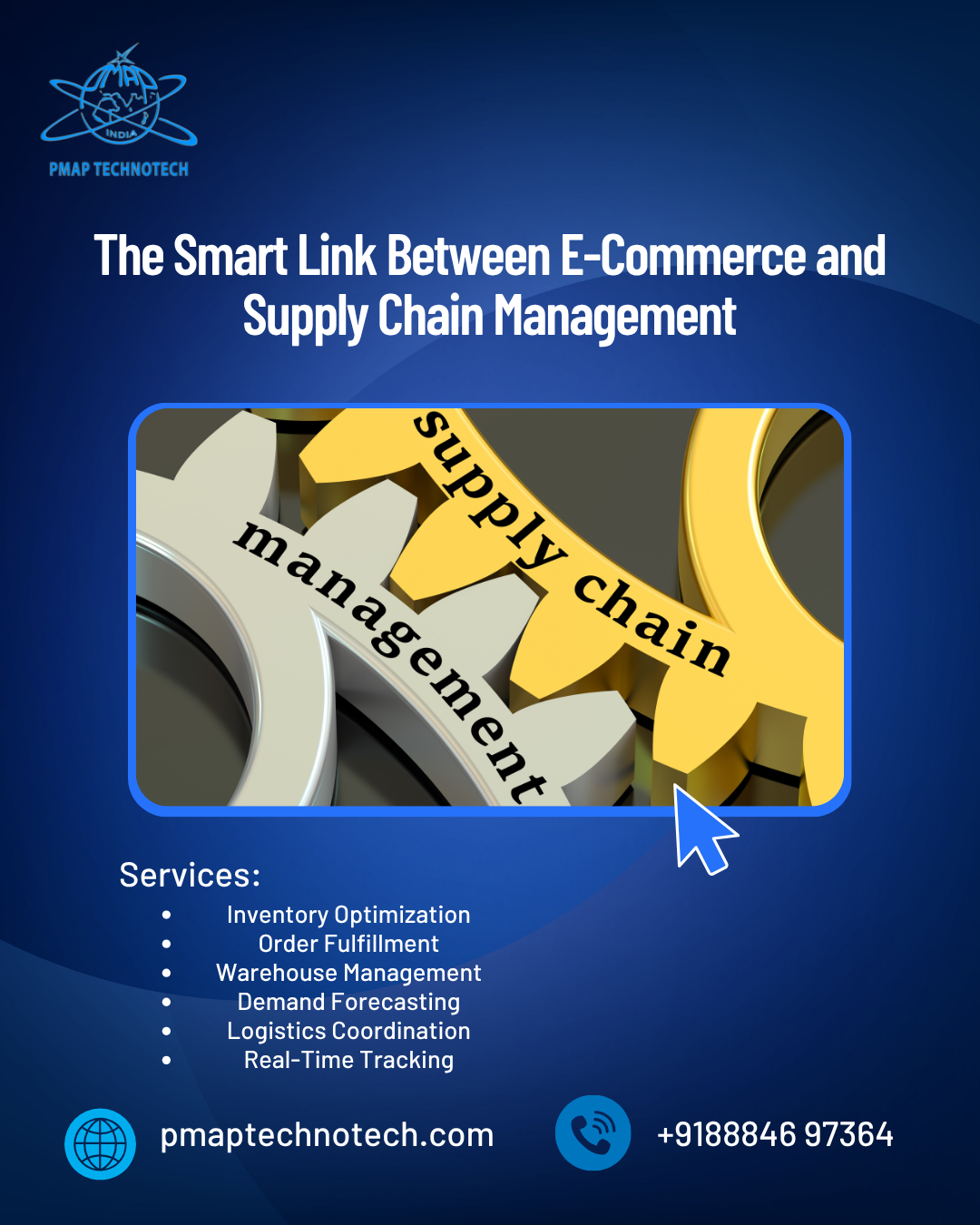E-commerce and supply chain management is the foundation of modern business in a digitally-driven age. Online retail continues its exponential growth. Industry reports predict that global ecommerce is expected to surpass $6 trillion in sales before 2025. Online markets have huge potential.
Success in e-commerce is more than just having a beautiful website or competitive prices. Supply chain management is at the core of any successful online retailer. SCM systems that are well designed will allow products to be moved smoothly from suppliers, into storage and finally into the hands or customers.
The integration of e-commerce and supply chain management is a necessity. Improving customer satisfaction, reducing costs and increasing delivery speed are essential. This blog offers practical insights to help companies optimize their business operations. It examines the link between inventory management, supply-chain (SCM) and ecommerce.

Supply Chain Management is also known as Supply Chain Coordination and Supply Chain Management. It is the coordination of all activities ranging from the purchase of raw materials up to the delivery of goods to clients. It involves the planning, implementation and monitoring of supply-chain processes with a goal to maximize efficiency and reduce costs.
SCM helps to ensure that product deliveries are made on time, control costs, and meet customer expectations. SCM becomes more important in ecommerce environments due to the requirement for real-time updating and fast shipping.
E-commerce and supply chain management means the sale or purchase of products and/or services online. As customers can now shop anywhere, anytime and at any hour, their expectations have changed. Businesses are being pushed to deliver goods and services more quickly.
Integration is the key to e-commerce and supply chain management. A poorly managed supply-chain can lead to stockouts and delivery delays. It may also result in unhappy customers.
Integrating supply-chain management with online operations ensures that online operations are cost-effective and efficient. They also put the customer first. SCM supports ecommerce on several levels.
Businesses that combine
e-commerce and supply chain management are able to scale quickly, adapt to changes on the market and maintain their competitive edge.

Integration of SCM with online shopping can bring many benefits.
1. The integration of e-commerce and supply chain management offers many benefits, but it also has its challenges.
2. Stockouts and Overstocking: Which is worse? Demand fluctuations can cause inventory mismatches.
3. Last-mile delivery continues to be complex and expensive.
4. Demand Forecasting errors - Inaccurate estimations can have a negative effect on supply chain efficiency.
5. Complexity in Reverse Logistic - Managing return efficiently can put a strain on your resources.
1. Predictive analytics is a powerful tool for improving demand planning.
2. When you partner with a reliable logistic provider, you can expect faster delivery.
3. Automated inventory management tools that are AI-driven will help you manage your inventory.
4. Create reverse logistics teams and flexible return policies.
Integration of supply chain and e-commerce and supply chain management electronic commerce requires modern technology.
Amazon's ability to successfully integrate supply chains with e-commerce is its key to success. Amazon's global logistic network and sophisticated warehouse automation are backed up by predictive analytics and a high-tech warehouse automation system.
Zara is an online retailer of fast fashion that uses SCM for replenishing stock within days. Zara's integration between ecommerce and SCM allows it to reflect current stock levels in online orders, which helps products reach customers quicker.
Shopify's SCM integration allows third-party SCM solutions to be used with Shopify ecommerce products. This helps automate the order and delivery process, as well as manage inventory. This helps small- and midsized businesses compete internationally.
Integrating supply chain management with ecommerce has now become a necessity and not a luxury. Businesses who invest in digital supply-chain management solutions will benefit from increased customer satisfaction, faster delivery and reduced costs.
SCM is optimized to work with e-commerce and supply chain management, a combination of technology,
Best ERP Software in India strategy, and process management. Inventory management and logistics, as well as predictive analytics, all play a part in creating seamless customer experiences.
For companies to stay competitive in this digital era, they must prioritize the smart integration of e-commerce and supply chain management. It allows them to transform challenges into opportunities, and offer customers exceptional value while driving their growth.
Answer: SCM improves e-commerce by ensuring timely deliveries, accurate inventories, and smooth order fulfilment.
Answer: Partner with reliable logistic providers, use real-time stock systems, automate the order processing process, and employ predictive analytics.
Answer: AI, IoT and ERP systems enhance visibility and forecasting. Advanced analytics and warehouse automation also improve delivery.
Answer: SCM integration helps small businesses to compete in the global market by reducing errors, optimizing inventory and enabling scalable growth.
Answer: Logistics is the process of moving products efficiently from warehouses and customers. This includes tracking, last-mile delivery and shipping optimization.
Answer: Accurate forecasting helps to predict customer demand and prevent stockouts. It also reduces costs by reducing operational expenses.
Answer: Stockouts, delays in delivery, reverse logistics challenges, and fluctuating demands are all obstacles.
Answer: AI improves operational efficiency by automating inventory replenishment and predicting demand patterns.
Answer: This reduces the cost of storage and provides accurate information to customers.
Answer: You can ensure faster delivery by using accurate orders, transparent tracking and efficient return management.
Answer: The future of integrated operations will be defined by greater automation, AI-driven prediction systems, and omnichannel supply chains.